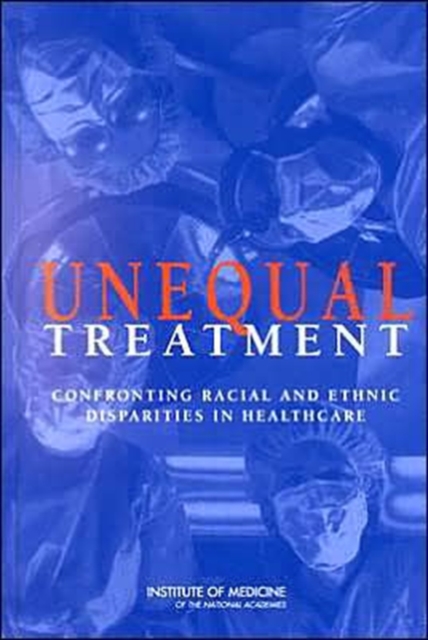
Unequal Treatment : Confronting Racial and Ethnic Disparities in Health Care Hardback
by Institute of Medicine, Board on Health Sciences Policy, Committee on Understanding and Eliminating Racial and Ethnic Disparities in Health Care
Edited by Alan R. Nelson, Adrienne Y. Stith, Brian D. Smedley
Hardback
Description
Racial and ethnic disparities in health care are known to reflect access to care and other issues that arise from differing socioeconomic conditions.
There is, however, increasing evidence that even after such differences are accounted for, race and ethnicity remain significant predictors of the quality of health care received. In Unequal Treatment, a panel of experts documents this evidence and explores how persons of color experience the health care environment.
The book examines how disparities in treatment may arise in health care systems and looks at aspects of the clinical encounter that may contribute to such disparities.
Patients' and providers' attitudes, expectations, and behavior are analyzed. How to intervene? Unequal Treatment offers recommendations for improvements in medical care financing, allocation of care, availability of language translation, community-based care, and other arenas.
The committee highlights the potential of cross-cultural education to improve provider?patient communication and offers a detailed look at how to integrate cross-cultural learning within the health professions.
The book concludes with recommendations for data collection and research initiatives.
Unequal Treatment will be vitally important to health care policymakers, administrators, providers, educators, and students as well as advocates for people of color. Table of ContentsFront MatterSummary1 Introduction and Literature Review2 The Healthcare Environment and Its Relation to Disparities3 Assessing Potential Sources of Racial and Ethnic Disparities inCare: Patient- and System-Level Factors4 Assessing Potential Sources of Racial and Ethnic Disparities inCare: The Clinical Encounter5 Interventions: Systemic Strategies6 Interventions: Cross-Cultural Education in the Health Professions7 Data Collection and Monitoring8 Needed ResearchReferencesAppendixesA Data Sources and MethodsB Literature ReviewC Federal-Level and Other Initiatives to Address Racial and EthnicDisparities in HealthcareD Racial Disparities in Healthcare: Highlights from Focus GroupFindingsE Committee and Staff BiographiesPaper ContributionsRacial and Ethnic Disparities in Diagnosis and Treatment: A Reviewof the Evidence and a Consideration of Causes - H.
Jack GeigerRacial and Ethnic Disparities in Healthcare: A Background andHistory - W.
Michael Byrd and Linda A. ClaytonThe Rationing of Healthcare and Health Disparity for the AmericanIndians/Alaska Natives - Jennie R.
JoePatient-Provider Communication: The Effect of Race and Ethnicity onProcess and Outcomes of Healthcare - Lisa A.
Cooper and Debra L. RoterThe Culture of Medicine and Racial, Ethnic, and Class Disparitiesin Healthcare - Mary-Jo DelVecchio Good, Cara James, Byron J.
Good,and Anne E. BeckerThe Civil Rights Dimension of Racial and Ethnic Disparities inHealth Status - Thomas E.
PerezRacial and Ethnic Disparities in Healthcare: Issues in the Design,Structure, and Administration of Federal Healthcare FinancingPrograms Supported Through Direct Public Funding - Sara RosenbaumThe Impact of Cost Containment Efforts on Racial and EthnicDisparities in Healthcare: A Conceptualization - Thomas RiceRacial and Ethnic Disparities in Healthcare: An Ethical Analysis ofWhen and How They Matter - Madison Powers and Ruth FadenIndex
Information
-
Available to Order - This title is available to order, with delivery expected within 2 weeks
- Format:Hardback
- Pages:780 pages
- Publisher:National Academies Press
- Publication Date:02/11/2002
- Category:
- ISBN:9780309085328
Other Formats
- EPUB from £107.99
- PDF from £66.42
Information
-
Available to Order - This title is available to order, with delivery expected within 2 weeks
- Format:Hardback
- Pages:780 pages
- Publisher:National Academies Press
- Publication Date:02/11/2002
- Category:
- ISBN:9780309085328






